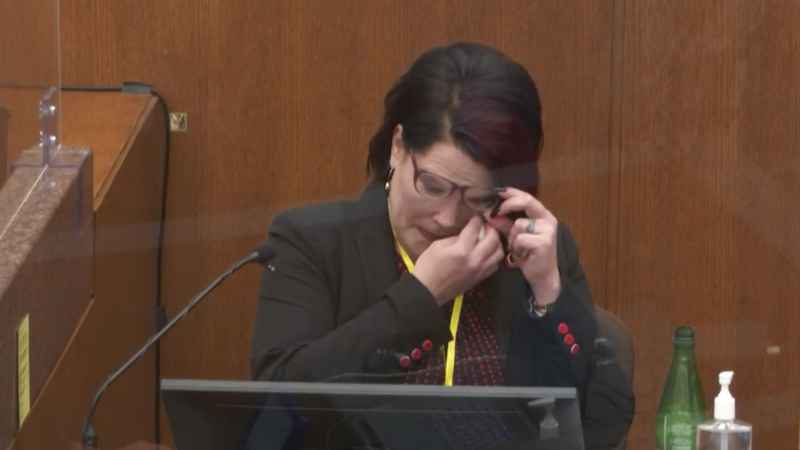In Derek Chauvin trial, testimony is key. But questions are equally important
[anvplayer video=”5018460″ station=”998122″]
One after another, the witnesses who took the stand this week in the Derek Chauvin murder trial recounted emotional and painful memories of the day they watched George Floyd die in police custody.
An off-duty Minneapolis firefighter said she was unable to give him medical assistance, despite repeatedly asking officers at the scene if she could intervene. A young woman who filmed the encounter said she stays up at night apologizing to George Floyd for "not doing more" to help him. The store clerk who sold Floyd cigarettes told the jury he wished he had not taken the counterfeit bill, saying it "could have been avoided."
The jury heard this testimony, in part, because of the carefully worded questions posed by prosecutors. While the testimony from bystanders is crucial to the state’s case, the questions attorneys are asking them are equally important.
"When you’re thinking about calling a witness, you want that witness to advance the theory of your case in some way," said Mary Moriarty, former chief public defender in Hennepin County. "I think an effective witness is one that is allowed to tell his or her story in a structured fashion."
Moriarty, who has represented clients in a dozen murder trials, said it’s up to the prosecuting attorney to allow the witness to tell the jury what they heard, saw and felt in a situation.

In this image from video, witness Courteney Ross answers questions as Hennepin County Judge Peter Cahill presides Thursday, April 1, 2021, in the trial of former Minneapolis police Officer Derek Chauvin at the Hennepin County Courthouse in Minneapolis, Minn. Chauvin is charged in the May 25, 2020 death of George Floyd.[Courtroom video]
As a general rule, if an attorney calls a witness to testify, they are supposed to ask open-ended questions, Moriarty said.
In court Thursday morning, prosecutor Matthew Frank allowed George Floyd’s girlfriend, Courteney Ross, to tell the story of how her and Floyd met. He then walked her through significant milestones in their relationship, including their shared struggle with opioid addiction.
"It’s on the lawyer who’s doing the direct that they are asking questions that the witness understands what they’re supposed to say," Moriarty said.
Later, Chauvin’s defense attorney, Eric Nelson, asked multiple follow-up questions about Floyd’s drug use during cross-examination.
Nelson: "When you met with prosecutors, did you tell them that you were in the car at a hotel when those pills were purchased?"
Ross: "Yes."
Nelson: "And that you were on the phone with Mr. Floyd at that time?"
Ross "Yes."
Nelson: "And you heard a voice in the background?"
Ross: "Yes."
Nelson: "And that was a voice you recognized to be Mr. Hall?"
Ross: "I thought so, yes."
The exchange above is an example of leading questions, used often by defense attorneys during cross-examination.
"You can ask questions that are very focused, that call for a yes or no answer and that give you an opportunity as the lawyer to put words in the witnesses’ mouths, for a lack of a better way to put it," said Susan Gaertner, a former prosecutor who now works as a criminal defense attorney.
There are situations where prosecutors could use leading questions, Gaertner said.
"It isn’t totally clear cut. There are some middle grounds," she said. "An example would be if a handful of leading questions will help move things along without really putting words in the witness’s mouth. Courts will often give some leeway to prosecutors, especially with young witnesses."
State vs. Chauvin: Who’s who in the courtroom?
The jury witnessed this during the testimony of four bystanders, who were minors at the time of the incident. The youngest was 9 years old.
Gaertner says it is common for prosecutors to prepare a witness before the trial.
"Most people have no idea what to expect when they’re on the witness stand," she said. "Preparation — no matter which side, in terms of that witness — is really the rule that makes the most difference."
One reason preparation is important is to make sure witnesses know what they are allowed to say and what they cannot say, Moriarty said.
"A lot of these are fine lines," she said. The public defender, who has been closely watching the Derek Chauvin trial, said many of the objections to testimony have to do with what’s called "foundation."
"A witness does not have foundation to be able to say what somebody else was thinking or to interpret it and that’s been the major fight here," she said.
Both Gaertner and Moriarty said it’s never a good idea to ask a question without already knowing the answer.
"Situations come up when you break the rules. Sometimes it’s good, sometimes it turns out badly," Gaertner said.